except用法
- 格式:doc
- 大小:44.00 KB
- 文档页数:11

except except for beside的区别摘要:1.引言:except,except for,beside的区别概述2.except用法详解3.except for用法详解4.beside用法详解5.总结:except,except for,beside在日常写作中的运用正文:在日常英语写作中,except,except for和beside这三个词组都有一定的使用频率。
虽然它们在某些情况下可以互换使用,但它们之间仍有明显的区别。
本文将详细介绍这三个词组的用法及其区别。
首先,让我们来看看except和except for的区别。
1.except用法except意为“除……之外”,它用于从某个整体中排除某些人或事物。
例如:I like all fruits, except oranges.(我喜欢所有的水果,除了橙子。
)2.except for用法except for意为“除了……以外”,它强调对某个事物的轻微修正或补充。
例如:The room is perfect, except for the color of the walls.(房间很完美,除了墙的颜色。
)接下来,我们来看看except和beside的区别。
3.beside用法beside意为“在……旁边”,它用于描述某人或某物所在的位置。
例如:He is sitting beside me.(他坐在我旁边。
)4.except和beside在日常写作中的运用在实际写作中,except和beside可以用来表示不同的概念。
except用于表示排除,而beside用于表示位置关系。
因此,正确选择这两个词组对于清晰表达作者的意图至关重要。
总之,except,except for和beside这三个词组在英语写作中有明显的区别。
except和except for主要用于表示排除,而beside主要用于表示位置关系。
在实际写作中,根据所需表达的含义,选择合适的词组是非常重要的。
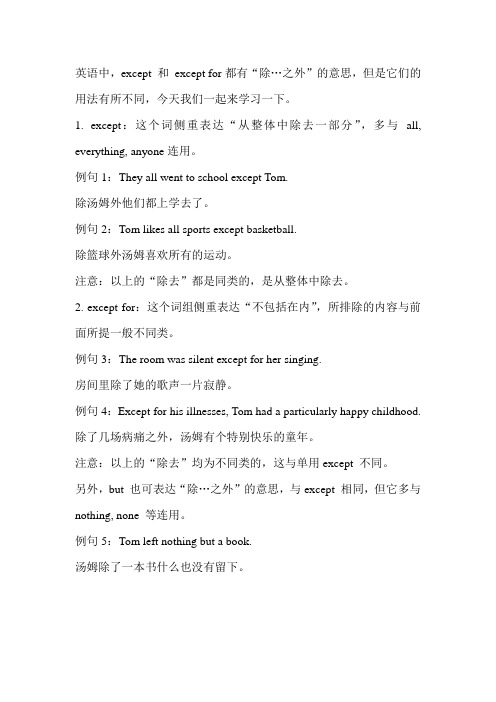
英语中,except 和except for都有“除…之外”的意思,但是它们的用法有所不同,今天我们一起来学习一下。
1. except:这个词侧重表达“从整体中除去一部分”,多与all, everything, anyone连用。
例句1:They all went to school except Tom.
除汤姆外他们都上学去了。
例句2:Tom likes all sports except basketball.
除篮球外汤姆喜欢所有的运动。
注意:以上的“除去”都是同类的,是从整体中除去。
2. except for:这个词组侧重表达“不包括在内”,所排除的内容与前面所提一般不同类。
例句3:The room was silent except for her singing.
房间里除了她的歌声一片寂静。
例句4:Except for his illnesses, Tom had a particularly happy childhood. 除了几场病痛之外,汤姆有个特别快乐的童年。
注意:以上的“除去”均为不同类的,这与单用except 不同。
另外,but 也可表达“除…之外”的意思,与except 相同,但它多与nothing, none 等连用。
例句5:Tom left nothing but a book.
汤姆除了一本书什么也没有留下。
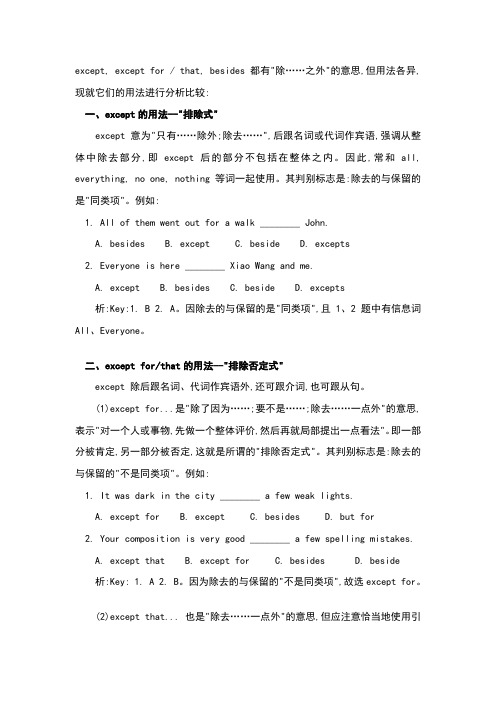
except, except for / that, besides都有"除……之外"的意思,但用法各异,现就它们的用法进行分析比较:一、except的用法--"排除式"except意为"只有……除外;除去……",后跟名词或代词作宾语,强调从整体中除去部分,即except后的部分不包括在整体之内。
因此,常和all, everything, no one, nothing等词一起使用。
其判别标志是:除去的与保留的是"同类项"。
例如:1. All of them went out for a walk ________ John.A. besidesB. exceptC. besideD. excepts2. Everyone is here ________ Xiao Wang and me.A. exceptB. besidesC. besideD. excepts析:Key:1. B 2. A。
因除去的与保留的是"同类项",且1、2题中有信息词All、Everyone。
二、except for/that的用法--"排除否定式"except 除后跟名词、代词作宾语外,还可跟介词,也可跟从句。
(1)except for...是"除了因为……;要不是……;除去……一点外"的意思,表示"对一个人或事物,先做一个整体评价,然后再就局部提出一点看法"。
即一部分被肯定,另一部分被否定,这就是所谓的"排除否定式"。
其判别标志是:除去的与保留的"不是同类项"。
例如:1. It was dark in the city ________ a few weak lights.A. except forB. exceptC. besidesD. but for2. Your composition is very good ________ a few spelling mistakes.A. except thatB. except forC. besidesD. beside析:Key: 1. A 2. B。
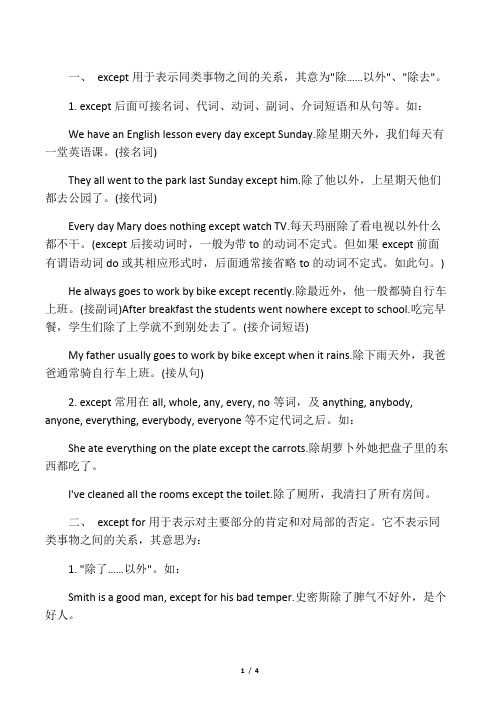
一、except用于表示同类事物之间的关系,其意为"除……以外"、"除去"。
1. except后面可接名词、代词、动词、副词、介词短语和从句等。
如:We have an English lesson every day except Sunday.除星期天外,我们每天有一堂英语课。
(接名词)They all went to the park last Sunday except him.除了他以外,上星期天他们都去公园了。
(接代词)Every day Mary does nothing except watch TV.每天玛丽除了看电视以外什么都不干。
(except后接动词时,一般为带to的动词不定式。
但如果except前面有谓语动词do或其相应形式时,后面通常接省略to的动词不定式。
如此句。
)He always goes to work by bike except recently.除最近外,他一般都骑自行车上班。
(接副词)After breakfast the students went nowhere except to school.吃完早餐,学生们除了上学就不到别处去了。
(接介词短语)My father usually goes to work by bike except when it rains.除下雨天外,我爸爸通常骑自行车上班。
(接从句)2. except常用在all, whole, any, every, no等词,及anything, anybody, anyone, everything, everybody, everyone等不定代词之后。
如:She ate everything on the plate except the carrots.除胡萝卜外她把盘子里的东西都吃了。
I've cleaned all the rooms except the toilet.除了厕所,我清扫了所有房间。
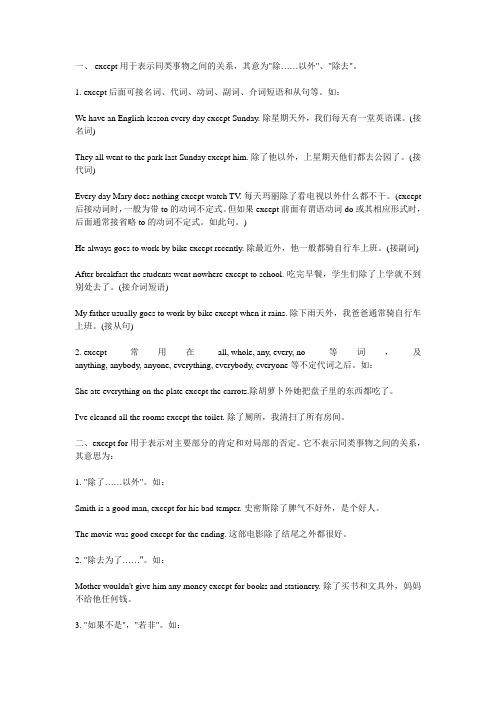
一、 except用于表示同类事物之间的关系,其意为"除……以外"、"除去"。
1. except后面可接名词、代词、动词、副词、介词短语和从句等。
如:We have an English lesson every day except Sunday. 除星期天外,我们每天有一堂英语课。
(接名词)They all went to the park last Sunday except him. 除了他以外,上星期天他们都去公园了。
(接代词)Every day Mary does nothing except watch TV. 每天玛丽除了看电视以外什么都不干。
(except 后接动词时,一般为带to的动词不定式。
但如果except前面有谓语动词do或其相应形式时,后面通常接省略to的动词不定式。
如此句。
)He always goes to work by bike except recently. 除最近外,他一般都骑自行车上班。
(接副词)After breakfast the students went nowhere except to school. 吃完早餐,学生们除了上学就不到别处去了。
(接介词短语)My father usually goes to work by bike except when it rains. 除下雨天外,我爸爸通常骑自行车上班。
(接从句)2. except常用在all, whole, any, every, no等词,及anything, anybody, anyone, everything, everybody, everyone等不定代词之后。
如:She ate everything on the plate except the carrots.除胡萝卜外她把盘子里的东西都吃了。
I've cleaned all the rooms except the toilet. 除了厕所,我清扫了所有房间。
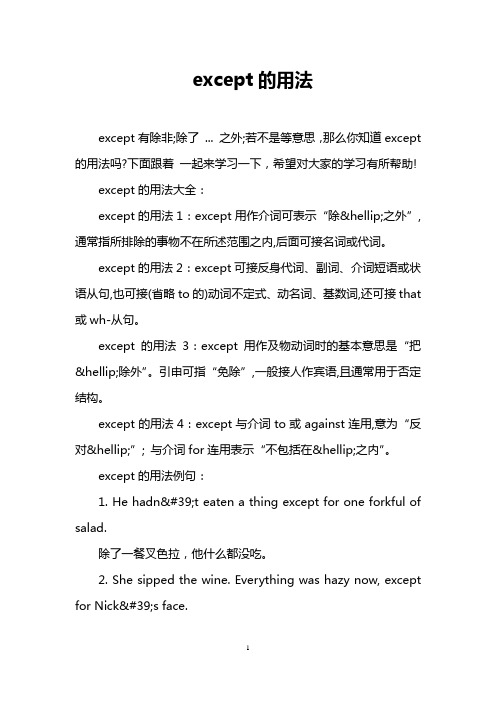
except的用法except有除非;除了 ... 之外;若不是等意思,那么你知道except 的用法吗?下面跟着一起来学习一下,希望对大家的学习有所帮助!except的用法大全:except的用法1:except用作介词可表示“除…之外”,通常指所排除的事物不在所述范围之内,后面可接名词或代词。
except的用法2:except可接反身代词、副词、介词短语或状语从句,也可接(省略to的)动词不定式、动名词、基数词,还可接that 或wh-从句。
except的用法3:except用作及物动词时的基本意思是“把…除外”。
引申可指“免除”,一般接人作宾语,且通常用于否定结构。
except的用法4:except与介词to或against连用,意为“反对…”; 与介词for连用表示“不包括在…之内”。
except的用法例句:1. He hadn't eaten a thing except for one forkful of salad.除了一餐叉色拉,他什么都没吃。
2. She sipped the wine. Everything was hazy now, except for Nick's face.她小口地抿着酒。
现在一切都变得模糊起来,除了尼克的脸。
3. Except for the remarkably tidy kitchen, the place was a mess.除了厨房特别干净外,这地方一片狼藉。
4. I sold everything I owned except for my car and my books.我把我所有的东西都卖掉了,只剩下汽车和书。
5. The snow, except where it drifted, was only calf-deep.除了吹得堆积起来的地方,雪只有小腿肚深。
关于except的用法及解释except在英语中是比较常见的一个单词,那么大家对于except的的相关知识了解多少呢?知道except的用法是什么吗?下面是小编给大家带来的关于except的用法及解释_except的用法和例句,以供大家参考,我们一起来看看吧!except的用法一、except作为介词1.除…之外,除了Everyone is ready except him.除了他,大家都准备好了.He won't work except when he is pleased.只有在高兴时他才会工作.二、except作为及物动词除去,把…除外except certain names from a list 在名单中除去某些人的名字except sb from a group 把某人从团体中开除nobody excepted 无一人例外present company excepted 在场者除外.三、except作为不及物动词1.反对conj.( 连接词 conjunction )1.【口】除外,只有I would go,except it's too far.我是要去,可是路太远了.2.【古·圣】除非except ye be born again 除非尔等再生.▼except的语法一、except的用法--"排除式"except意为"只有……除外;除去……",后跟名词或代词作宾语,强调从整体中除去部分,即except后的部分不包括在整体之内。
因此,常和all, everything, no one, nothing等词一起使用。
其判别标志是:除去的与保留的是"同类项"。
例如:1. All of them went out for a walk ________ John.A. besidesB. exceptC. besideD. excepts2. Everyone is here ________ Xiao Wang and me.A. exceptB. besidesC. besideD. excepts析:Key:1. B 2. A。
except和besides的区别
Except和besides都是英语中的介词,它们的用法和意义有所不同。
Except通常表示“除了……之外”,常用于否定句或疑问句中。
例如:
- I like all fruits except for bananas.(除了香蕉,我喜欢所有的水果。
)
- Who is coming to the party except for John?(除了约翰,还有谁来参加聚会)
除此之外,except还可以作为连词使用,表示“除了……之外还有……”。
例如:
- Everyone was there except for John, and he arrived later.(除了约翰,所有人都到齐了,他后来到的。
)
Besides通常表示“除了……之外还有……”,用于肯定句中。
例如:
- Besides studying, I also like to play sports.(除了学习,我还喜欢运动。
)- Besides being a doctor, he is also a talented musician.(除了是医生,他还是一位有才华的音乐家。
)
此外,besides还可以表示“此外,还有……”,用于列举事物时。
例如:
- Besides apples and oranges, we also have bananas and grapes.(除了苹果和橘子,我们还有香蕉和葡萄。
)
总的来说,except和besides都可以表示“除了……之外”,但是except更常用于否定句或疑问句中,而besides更常用于肯定句和列举事物时。
except,besides,except for用法的关联和区别1.作介词用法时,这三个词都有"除…之外"的含义,但except常与do/does/did/have/has /hadnothing等词形成搭配用法,或者与全部肯定词all、everything、ev?eryone等连用,或者与全部否定词nothing、nobody等连用,因此except加宾语作介词"除…之外"时常表示从整体中剔除一部分;而besides作"除…之外"时则表示"另外附加"的含义,相当于"in addition to"。
试比较下列例句:1)He did not hing except watch TV yesterday.2)He said nothing except to smile just now.3)All the students took at rip except Tom yesterday. 4)We need 3 more persons to finish the job besides/inaddition to us two.2.作介词用法时的except后可接多种情况的介词短语。
在这种情况下,except后的介词是不可省去的,except加介词的实际作用就相当于连词加相关的从句。
例如:1)The weather is fine today except in the northwest.此句相当于: The weather is fine today except that it is in the northwest.2)His mother never takes any exercise except on the dance floor.此句相当于: His mother never takes any exercise except that she has adance on the floor.需要强调的是except与exceptfor的用法区别:1)Except后排除的内容与主语往往是同一类的,而exceptfor后所排除的内容与主语往往不是同一类的。
besides 和except
except和besides的区别:意思不同、用法不同、侧重点不同
一、意思不同
1.except意思:prep. (用于所言不包括的人或事物前)除…之外; conj. 除了; 只是; v. 不包括; 不
2.besides意思:prep. 除…之外(还); adv. 况且; 再说; 此外; 以及; 也;
二、用法不同
1.except用法:表示动作或状态。
例句:
They all went to sleep except me.
除我之外,他们都去睡觉了。
2.besides用法:常用作谓语。
例句:
No one writes to me besides you.
除你以外,没有人给我写信。
三、侧重点不同
1.except侧重点:except指在已有的整体里再加入一部分,表达的是肯定的含义。
2.besides侧重点:besides指的是从整体中除去某一部分,表达的是否定的含义。
1。
except ,besides,except for,but 之间的区别及例句这四个介词或者短语都可以表示“除了…”的意思。
但except仅表示“除了…”,排除在外,后面可以接that,what,when等引导的从句;而besides表示“除了…还有…”的意思,表示包含在内;except for表示“除了…”,它引出一个与前面的词相反的原因或者事例;but的意思与except接近,它主要与某些不定代词如nothing,all,anything, no one,anyone等连用。
例如:"Except for one old lady, the bus was empty."公共汽车上要不是坐了一位老太太就是空的。
She can do everything except cook.除了做饭之外她什么都会。
He had considered everything except the weather."他什么都想过,唯独没考虑到天气。
"I know nothing about it except what I have read in the papers. "除了在报上读到的以外,我对这件事一无所知。
"Most of the Chinese people usually go to work on the bike except when it rains."除了雨天,大多数中国人一般都骑自行车上班。
"Besides milk and cheese, we need vegetables.除了牛奶和干酪外,我们还需要蔬菜。
Besides football, I like playing basketball and table tennis.除了足球以外,我还喜欢打篮球和乒乓球。
No one but me passed the exam yesterday.昨天除了我以外没别人考及格。
Nobody but Li Ming talked to Lao Wang today.除了李明,今天没有人跟老王说话。
用法习题:1. No one knew Mr Beson's address _______ his daughter.A. exceptB. exceptsC. onlyD. besides2. Do you know any other foreign language ______ English?A. exceptB. butC. besideD. besides3. I know nothing about the young lady ________ she is from Beijing.A. exceptB. except forC. except thatD. besides析:Key:1. A 2. D 3. C一、except的用法--"排除式"except意为"只有……除外;除去……",后跟名词或代词作宾语,强调从整体中除去部分,即except后的部分不包括在整体之内。
因此,常和all, everything, no one, nothing等词一起使用。
其判别标志是:除去的与保留的是"同类项"。
例如:1. All of them went out for a walk ________ John.A. besidesB. exceptC. besideD. excepts2. Everyone is here ________ Xiao Wang and me.A. exceptB. besidesC. besideD. excepts析:Key:1. B 2. A。
因除去的与保留的是"同类项",且1、2题中有信息词All、Everyone。
二、except for/that的用法--"排除否定式"except 除后跟名词、代词作宾语外,还可跟介词,也可跟从句。
(1)except for...是"除了因为……;要不是……;除去……一点外"的意思,表示"对一个人或事物,先做一个整体评价,然后再就局部提出一点看法"。
即一部分被肯定,另一部分被否定,这就是所谓的"排除否定式"。
其判别标志是:除去的与保留的"不是同类项"。
例如:1. It was dark in the city ________ a few weak lights.A. except forB. exceptC. besidesD. but for2. Your composition is very good ________ a few spelling mistakes.A. except thatB. except forC. besidesD. beside析:Key: 1. A 2. B。
因为除去的与保留的"不是同类项",故选except for。
(2)except that... 也是"除去……一点外"的意思,但应注意恰当地使用引导词。
若从句句意和结构完整,只需用引导词that。
例如: 1. The suit fitted him well ________ the colour was a little brighter.A. except forB. except thatC. except whenD. besides 析:Key:B。
本题题意为"除色彩艳了一点儿外,这套衣服很适合他",从句the colour was a little brighter句意和结构完整,只需用引导词that,故选except that。
2. -Can you tell me all about the earthquake?-Sorry,I know nothing about it ________ I read in the newspaper.A. exceptB. except forC. except whatD. except that析:Key:C。
因从句中read为及物动词,且其后无宾语,故选except what。
3. Mr Green usually goes to work by bus ________ it rains.A. besidesB. except whenC. except whatD. beside析:Key:B。
由于it rains为从句,故排除A、D,且rains为不及物动词,不需要宾语,故排除C。
except when 意为"除了当……的时候"。
(3)except for与except that有时可互相转换。
例如:1. Your composition is very good except for a few spelling mistakes.=Your composition is very good except that there are a few spelling mistakes.2. The village is very quiet except for some birds singing in the woods.=The village is very quiet except that there are some birds singing in the woods.三、besides的用法--"包括式"besides相当于as well as,意为"除了……以外还有……",即"除去一部分还有另外一部分"的意思,表示besides 后面的部分包括在整体之内。
例如:1. Does John know any other foreign language ________ French.A. exceptB. butC. besidesD. beside析:Key:C。
由本题中的信息词"any other foreign language",可知选besides。
四、but的用法--"排除式"but是"除了……以外"的意思,相当于except。
(1)but后也可以接名词或代词作宾语。
例如:1. They all went to the park ________ Mike and me.A. besidesB. except forC. butD. beside析:Key: C。
因为all是信息词,且they与Mike and me是"同类项",根据句意应选C。
(2)but常与下列词连用:a.否定词no one, none, nothing等; b.疑问词who, what等; c.不定代词all, everyone等。
例如:1. Nothing but disaster would come from such a plan.这个计划只能招灾惹祸,别无益处。
2. Who but Tom would do such a thing?除了汤姆以外还有谁愿意干这种事?(3)but后可接动词不定式。
注意:当but前面有实义动词do以及其相应形式作谓语动词时,则其后跟不带"to"的动词不定式,反之加"to"。
例如:1. David could do nothing but ________ his teacher yesterday afternoon.A. helpB. helpedC. helpingD. to help析:key:A。
do nothing but...后应接动词原形,意为"除做……外什么也不做"。
注意:but for是"要不是;没有……"的意思,常用于虚拟语气。
例如: But for your help, I would have failed. 要是没有你的帮助, 我早就失败了。
此外:apart from也可表示此意,其用法相当与besides, except for(注:专业文档是经验性极强的领域,无法思考和涵盖全面,素材和资料部分来自网络,供参考。
可复制、编制,期待你的好评与关注)。